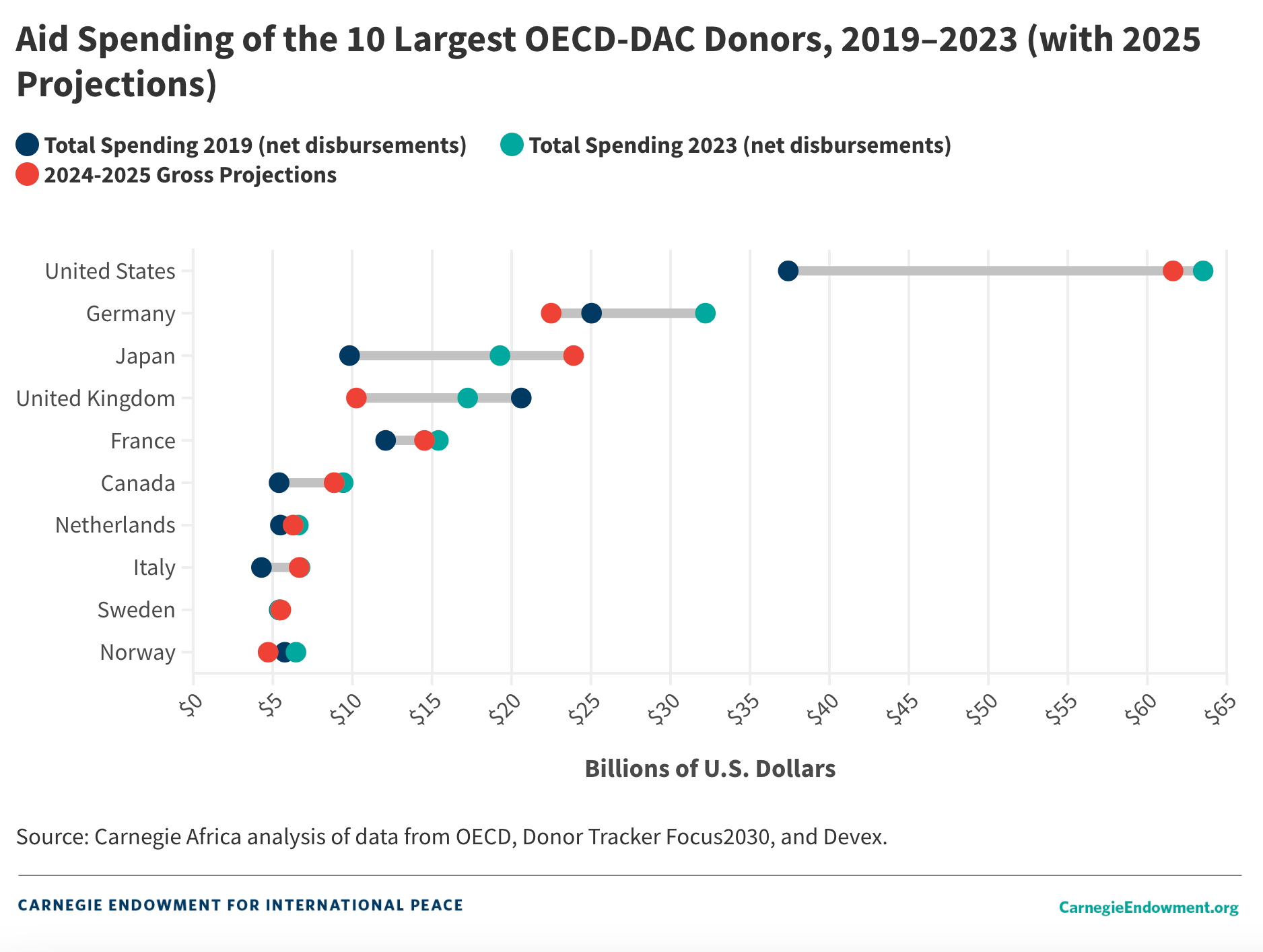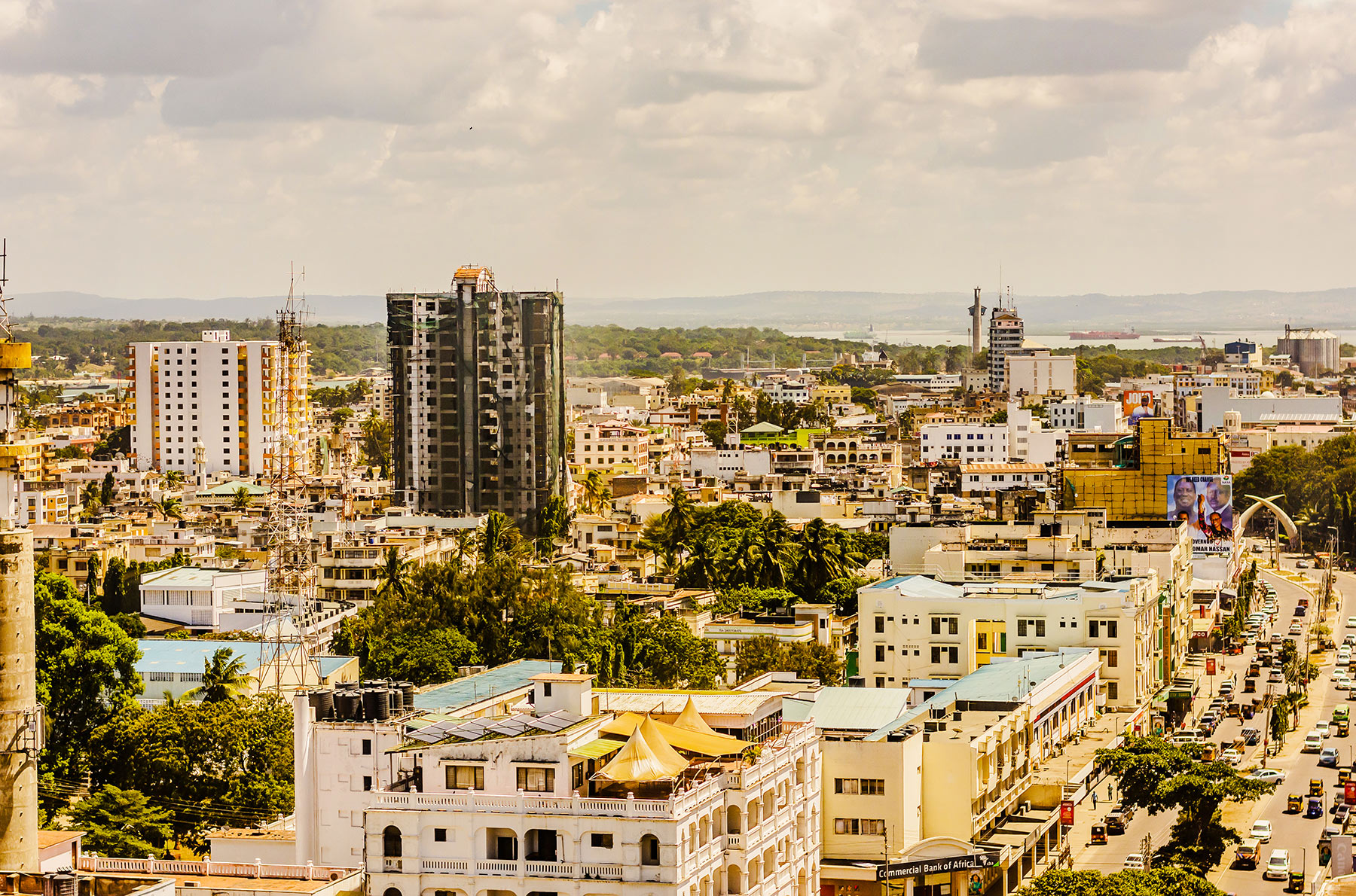February 2025
Dear friends,
A belated Happy New Year as this is our first newsletter in 2025!
A few hours after his inauguration as president on January 20, Donald Trump began signing a flurry of Executive Orders (EOs). While many of these orders are directly related to U.S. domestic issues, others had and will continue to have effects on the African continent. From America-First trade policy to the freeze of foreign aid, from withdrawing from both the World Health Organization and the Paris Agreement to energy policy President Trump’s EOs will have a profound impact on U.S.-Africa relations. In a new article, I identify specific ways in which we may see impacts of these EOs across countries in Africa and the Global South.
On this backdrop, the Africa Program officially launched our compendium: Priorities for the New U.S. Administration and Congress on Strengthening Economic Relations with Africa. The live, in-person event featured two panels of Carnegie scholars and authors who discussed the key findings from the publication that have the potential to reinvigorate U.S. engagement with African nations. Watch the event playback here and be sure to read the compendium.
The dismantling of USAID has sent tremors across the world of global development. Starting with the aid freeze directed by President Trump, followed by the “stop work” orders issued by the State Department on all U.S. aid funded projects around the world, to the deactivation of the USAID website and the placement of thousands of workers on administrative leave, it appears that the world’s largest aid agency is effectively being remade. What emerges from this turbulent process remains to be seen. Yet, this follows a similar pattern of collapsing previously independent bilateral aid agencies into the foreign affairs ministries of donor countries. The UK’s Department for International Development (DfID) was collapsed into the Foreign and Commonwealth Development Office in 2020; the Canadian Agency for International Development was merged into the Department of Foreign Affairs in 2013 as was the case for the Australian Agency for International Development, among several others.
Therefore, our February Chart of the Month returns to an October 2024 publication that shows that many of the ten largest OECD-DAC donors, mostly in Western countries, have decreased their aid budgets in recent years. Depending on the direction that the Trump administration takes U.S. bilateral aid after the conclusion of the 90-day review in April, it seems likely that there will be decisive changes to the volume, targets and actors involved in Official Development Assistance (ODA). We will be keeping track of the rapid developments in this space, given the role of foreign aid in Africa’s international economic relations.
On a different note, Africa Program fellow Jane Munga recently participated in the 2024 SiliconXChange Conference where she moderated a panel on “Implications of AI Governance for Africa Under a Trump Presidency”. She also participated in the Africa Subsea Ecosystem Forum Summit where she led a workshop on the policy complexity of undersea cable governance. Then, in January, Dr. Munga participated in the launch of The Network of African Women in AI in Nairobi. The launch event united key stakeholders to explore opportunities, challenges, and actions for advancing women's participation in AI and promoting equity in Africa's digital future. On the panel “Fostering Ethical AI Systems in Africa”, she spoke on the impact of responsible AI development, bias mitigation, and ensuring inclusivity in AI solutions.
In February, the Carnegie Africa Program returned to the 2025 edition of one of the world’s largest mining conferences, Investing in African Mining Indaba in Cape Town, South Africa. To advance our ongoing work on Africa’s critical energy transition minerals, we convened a private roundtable called “Technical Frontiers and Innovations in Mining Science for the Clean Energy Transition: Examining U.S.-Africa Collaborations.” This event brought together technical experts from U.S. and African government agencies, the private sector, universities, and nongovernmental organizations to identify tangible areas for technical cooperation between the U.S. and African countries on critical energy transition and defense-industrial minerals and metals. These include geological mapping and surveys, expansion of exploration, human capital investments in mining and geological sciences, mining waste and recycling among other areas. Be on the lookout for a policy brief, that we will publish soon, summarizing the findings of this rich discussion, as well as further activity on this front.
In the coming weeks, we look forward to sharing more insights on the rapid policy shifts in Washington, DC as they relate to Africa – from energy to critical minerals to trade and AI/tech policy. We also have publications in the pipeline on geopolitics in the World Trade Organization; specific proposals on critical minerals engagement and diplomacy; ongoing work on climate finance as well as ideas about rethinking and reorienting development assistance to Africa for mutual benefits in the new era of great power competition. Stay tuned! Be sure to subscribe to our newsletter, follow us on LinkedIn, and follow us on X (formerly Twitter) at @AfricaCarnegie.
Sincerely,
Zainab Usman
Director, Carnegie Africa Program
Chart of the Month

Features
The Six Areas in Trump’s Executive Orders that Countries in Africa and the Global South Should Pay Attention to
Donald Trump’s flurry of executive orders presents perils and opportunities to Africa and the Global South. Understanding the new policy environment will be crucial for them to take advantage.
By Zainab Usman
Priorities for the New U.S. Administration and Congress on Strengthening Economic Relations with Africa
This compendium identifies high impact areas that could transform U.S. engagement in Africa and offers actionable recommendations that could inform implementation.
By the Carnegie Africa Program
How U.S.-Africa Relations Might Shift Under a 2nd Trump Administration
Africa experts Zainab Usman and Mvemba Phezo Dizolele talk with NPR's Asma Khalid about what a second Donald Trump term could mean for the continent.
By NPR News
Carnegie Endowment explores US, Africa Relationships Under Trump
Experts at the Carnegie Endowment for International Peace published a compendium, a road map of potential ideas to reinvigorate US engagement on the continent.
By Voice of America
Our Shared Energy Security: Why the U.S. and Its Energy-Poor Allies Must Coinvest in Solutions—and How
Many of the countries with globally significant mineral resources—which the United States and its allies will depend on to diversify the clean energy supply chain—are deeply energy insecure.
By Katie Auth
Developments on Our Radar
Trump Advisers Look to Shift US Foreign Aid to Wall Street Ally [Bloomberg]
US Aid Tracker: Following Trump's Cuts to International Development [Devex]
Senate Africa chairman Ted Cruz Calms Ambassadors’ Trump Jitters [The Africa Report]
What Nigeria’s 2025 GDP rebasing means [Nairametrics]
Why The US Is Turning Up the Heat on South Africa [The Mail & Guardian]
Professional Development Opportunities
British Academy International Fellowships Programme [application]
